BUDAPEST, Hungary — A COVID-19 infection increases the risk for neurodevelopmental changes in babies whose mothers got sick during pregnancy, according to a preliminary analysis from the European Psychiatric Association. Six weeks after being born, babies showed problems with motor control such as trouble relaxing when held and controlling head and shoulder movement.
“Not all babies born to mothers infected with COVID show neurodevelopmental differences, but our data shows that their risk is increased in comparison to those not exposed to COVID in the womb. We need a bigger study to confirm the exact extent of the difference,” says Rosa Ayesa Arriola, a senior researcher at the Valdecilla Research Institute and study coauthor in a conference media release.
The team studied 21 babies born to women who tested positive for COVID-19 while pregnant. Researchers used a separate group of 21 babies born to mothers without infection as a control group for comparison purposes. All the mothers participated in multiple tests ranging from hormonal tests to psychological questionnaires during and after pregnancy. The Neonatal Behavioral Assessment Scale measured a baby’s capacity for movement and other behaviors.
“We found that certain elements of the NBAS measurement were changed in 6-week-old infants who had been exposed to the SARS-COV-2 virus. Effectively they react slightly differently to being held, or cuddled,” explains Águeda Castro Quintas, a researcher at the University of Barcelona and study co-author.
Does COVID also affect a child’s verbal skills?
The results are part of a wider project that is tracking the pregnancy and fetal development in 100 babies born to 100 mothers who previously had a COVID-19 infection. While the current results detail the neurodevelopmental outcomes six weeks after birth, the study will look to see if there are more long-term consequences. In addition to motor development, the researchers plan to examine language development in babies between 18 and 42 months-old. Future research will also look at the mothers and babies exposed to COVID-19 and compare it to a separate cohort that is studying how stress and genetics affect child development.
The study has a small sample of participants and will require more data before determining COVID-19’s true impact on babies’ neurodevelopmental outcomes.
“In the meantime, we need to stress the importance of medical monitoring to facilitate a healthy pregnancy, discussing any concerns with your doctor wherever necessary,” adds researcher Nerea San Martín González.
The team presented their findings at the 30th European Congress of Psychiatry.

